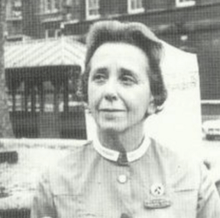Winifred Hector
Winifred Emily Hector (21 December 1909 — 14 September 2002) was an English nurse and textbook author. She is credited with introducing modern curriculum and teaching methods to British nursing education.[1]

Early life and education
Winifred Emily Hector was born at Taunton in Somerset, the daughter of Sidney Charles Hector and Beatrice Dugdale Hector. Her father worked on the Great Western Railway. She attended Bishop Fox's School in Taunton, and earned an intermediate bachelor of arts degree in English at Bedford College, London. Her near-sightedness made it difficult to manage the reading involved in further study of literature, so she turned her attention to nursing, as a student at St. Bartholomew's Hospital.[2] Much later in life, she earned a master's degree at City University London, with research on the life of Ethel Gordon Fenwick, a founder of the International Council of Nurses.[3]
Career
Hector was in charge of nurses' preliminary training at the Manchester Royal Infirmary at the beginning of World War II. She ran a surgical ward at St. Bartholomew's during the London Blitz, treating mainly acute injuries of bombing victims.[4] She moved into teaching, taking the position of senior tutor at the war's end.[5] She established "one of the first university courses for nurses," at City University, beginning in 1968.[6]
Textbooks by Winifred Hector included Modern Gynaecology and Obstetrics For Nurses (1956, with John Howkins, revised 1963 and 1974 with Gordon Bourne),[7] Modern Nursing: Theory and Practice (1960),[8] A Textbook of Medicine for Nurses (1967, with Gordon Hamilton Fairley),[9] and Nursing Care for the Dying Patient (1982).[10] She also wrote an autobiography, Memoirs of a Somerset Woman (1997), and a book about nursing for lay readers, The Role of the Nurse (1977).[11]
She retired from St. Bartholomew's in 1970. For a decade after she retired, she was a lecturer at Queen Elizabeth College. In 1970, she was one of the founding members of the board of the Medical Recording Service, a body founded to support quality film and audio productions for medical education.[12] In 1976, she was named a Fellow of the Royal College of Nursing. In 1978, she was script adviser on a series of ten films for nursing education.[13]
Winifred Hector died in 2002, after several years of ill health, in London, aged 91 years.[2]
References
- Sue Thackray, "Winifred Hector: Pioneering Reformer of Nursing Education" The Guardian (1 October 2002).
- Jane Brooks, "Hector, Winifred Emily (1909–2002)" Oxford Dictionary of National Biography (Oxford University Press 2006).
- Winifred Hector, The Work of Mrs. Bedford Fenwick and the Rise of Professional Nursing (Royal College of Nursing 1973).
- Barbara Mortimer, Sisters: Heroic True Stories of the Nurses of World War II (Random House 2013): 98. ISBN 9781448184132
- "A Special Study Time for Nurses" The Age (28 March 1961): 6.
- Laurence Dopson, "Obituary Winifred Hector" Nursing Standard 17(2)(25 September 2002): 31.
- Winifred Hector and Gordon Bourne, Modern Gynaecology and Obstetrics for Nurses (Heinemann Medical 1974). ISBN 9780433142102
- Winifred Hector, Modern Nursing Theory and Practice (Heinemann Medical 1968).
- Winifred Hector and G. Hamilton-Fairley, A Textbook of Medicine for Nurses (Heinemann Medical 1973). ISBN 9780433142089
- Winifred Hector, Nursing Care for the Dying Patient (Heinemann Medical 1982). ISBN 9780433142195
- Winifred Hector, The Role of the Nurse (BBC Books, 1977). ISBN 9780563161356
- John and Valerie Graves, "The Medical Recording Service and the Medical Audiovisual Library" in John Fry, R. J. F. H. Pinsent, eds., A History of the Royal College of General Practitioners: The First 25 Years (Spring Science and Business Media 2012): 106-107. ISBN 9789401159159
- "Winifred Hector filmography" British Film Institute.